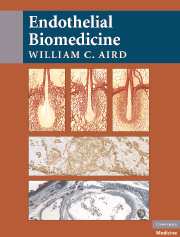Book contents
- Frontmatter
- Contents
- Editor, Associate Editors, Artistic Consultant, and Contributors
- Preface
- PART I CONTEXT
- PART II ENDOTHELIAL CELL AS INPUT-OUTPUT DEVICE
- PART III VASCULAR BED/ORGAN STRUCTURE AND FUNCTION IN HEALTH AND DISEASE
- PART IV DIAGNOSIS AND TREATMENT
- 172 Introductory Essay: Diagnosis and Treatment
- 173 Circulating Markers of Endothelial Function
- 174 Blood Endothelial Cells
- 175 Endothelial Microparticles: Biology, Function, Assay and Clinical Application
- 176 Molecular Magnetic Resonance Imaging
- 177 Real-Time Imaging of the Endothelium
- 178 Diagnosing Endothelial Cell Dysfunction
- 179 Statins
- 180 Steroid Hormones
- 181 Organic Nitrates: Exogenous Nitric Oxide Administration and Its Influence on the Vascular Endothelium
- 182 Therapeutic Approaches to Altering Hemodynamic Forces
- 183 Stent- and Nonstent-Based Cell Therapy for Vascular Disease
- 184 Building Blood Vessels
- 185 Gene Transfer and Expression in the Vascular Endothelium
- 186 Drug Targeting to Endothelium
- PART V CHALLENGES AND OPPORTUNITIES
- Index
- Plate section
179 - Statins
from PART IV - DIAGNOSIS AND TREATMENT
Published online by Cambridge University Press: 04 May 2010
- Frontmatter
- Contents
- Editor, Associate Editors, Artistic Consultant, and Contributors
- Preface
- PART I CONTEXT
- PART II ENDOTHELIAL CELL AS INPUT-OUTPUT DEVICE
- PART III VASCULAR BED/ORGAN STRUCTURE AND FUNCTION IN HEALTH AND DISEASE
- PART IV DIAGNOSIS AND TREATMENT
- 172 Introductory Essay: Diagnosis and Treatment
- 173 Circulating Markers of Endothelial Function
- 174 Blood Endothelial Cells
- 175 Endothelial Microparticles: Biology, Function, Assay and Clinical Application
- 176 Molecular Magnetic Resonance Imaging
- 177 Real-Time Imaging of the Endothelium
- 178 Diagnosing Endothelial Cell Dysfunction
- 179 Statins
- 180 Steroid Hormones
- 181 Organic Nitrates: Exogenous Nitric Oxide Administration and Its Influence on the Vascular Endothelium
- 182 Therapeutic Approaches to Altering Hemodynamic Forces
- 183 Stent- and Nonstent-Based Cell Therapy for Vascular Disease
- 184 Building Blood Vessels
- 185 Gene Transfer and Expression in the Vascular Endothelium
- 186 Drug Targeting to Endothelium
- PART V CHALLENGES AND OPPORTUNITIES
- Index
- Plate section
Summary
Risk factors for cardiovascular disease, such as cigarette smoking, hypertension, and elevated serum lipid levels impair endothelial function and lead to the development of atherosclerosis. Recent studies suggest that 3-hydroxy-3-methylglutaryl- CoA (HMG-CoA) reductase inhibitors or statins reduce cardiovascular events, in part, by improving endothelial function. Statins reduce plasma cholesterol levels, thereby decreasing the uptake of modified lipoproteins by endothelial cells (ECs). There is increasing evidence, however, that statins may also exert effects beyond cholesterol lowering. Many of these cholesterol-independent or “pleiotropic” vascular effects of statins appear to involve restoring or improving endothelial function by increasing the bioavailability of nitric oxide (NO), promoting re-endothelization, reducing oxidative stress, inhibiting inflammatory responses, and increasing fibrinolysis. Thus, the endothelium-dependent effects of statinsmay contribute to many of the beneficial effects of statin therapy in cardiovascular disease.
STATINS AND ENDOTHELIAL FUNCTION
Statins inhibit an early rate-limiting step in cholesterol biosynthesis (Figure 179.1). This leads to increased hepatic low density lipoprotein (LDL) receptors and enhanced uptake of cholesterol by the liver. Indeed, therapeutic doses of statins potently reduce serum cholesterol levels in humans, and several large clinical trials have demonstrated that inhibition of HMG-CoA reductase by statins markedly decreases the incidence of cardiovascular events in hypercholesterolemic individuals (1,2). Because of the strong association between elevated serum cholesterol levels and coronary atherosclerotic disease, the reduction of serum cholesterol levels by statins has been proposed to be the predominant mechanism underlying the beneficial effects of these drugs. Indeed, acute plasma LDL aphaeresis improves endothelium-dependent vasodilatation (3), suggesting that statins could restore endothelial function, in part, by lowering serum cholesterol levels.
- Type
- Chapter
- Information
- Endothelial Biomedicine , pp. 1668 - 1673Publisher: Cambridge University PressPrint publication year: 2007



